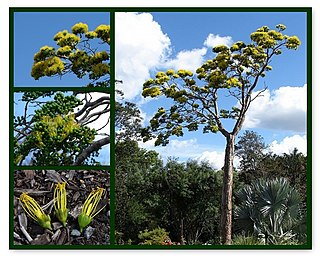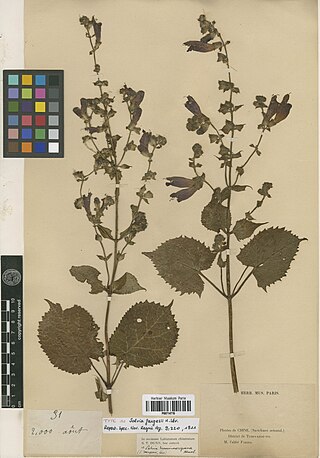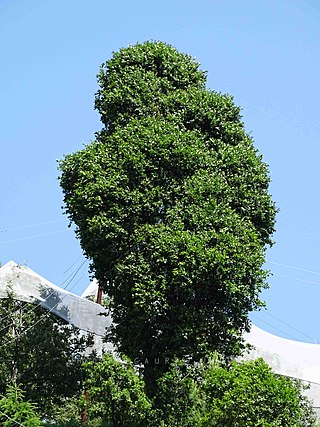
Myrciaria floribunda, commonly known as cambuizeiro, guavaberry or rumberry, is a species of plant in the family Myrtaceae. It can be found across South and Central America and the West Indies in dry or moist coastal woodlands, up to 300 metres above sea level. The guavaberry, which should not be confused with the guava, is a close relative of camu camu.

Nuytsia floribunda is a hemiparasitic tree found in Western Australia. The species is known locally as moodjar and, more recently, the Christmas tree or Western Australian Christmas tree. The display of intensely bright flowers during the austral summer coincides with the Christmas season.

Delonix floribunda is a species of plant in the family Fabaceae. It is found only in Madagascar.
Dendrophorbium floribundum is a species of flowering plant in the family Asteraceae. It is found only in Ecuador. Its natural habitat is subtropical or tropical moist montane forests. It is threatened by habitat loss.

Lagerstroemia floribunda, also known as Thai crape myrtle and kedah bungor, is a species of flowering plant in the family Lythraceae. It is native of the tropical region of Southeast Asia.
Scaevola floribunda is a species of plant in the family Goodeniaceae. It is endemic to Fiji.
Alchornea floribunda is a plant native to tropical Africa. The plant is locally known as Niando.

Cerbera floribunda, commonly known as cassowary plum, grey milkwood, or rubber tree, is a plant in the family Apocynaceae which is native to the region from Sulawesi to the Solomon Islands, including north east Queensland.

Nuxia floribunda, the forest elder, forest nuxia or wild elder, is a species of tree in the Stilbaceae family, that is native to moist regions of southern Africa, East Africa and central tropical Africa.

Salvia maximowicziana is a perennial plant in the family Lamiaceae. It is found growing on grasslands, forests, and forest edges in China, at 1,800 to 3,300 m elevation. It grows 10 to 90 cm tall, with circular-cordate to ovate-cordate leaves that are typically 3 to 8 cm long and 6 to 8 cm wide. The upper leaf surface is nearly smooth, or lightly covered with hairs, while the underside has glandular hairs on the veins.

Grevillea floribunda, commonly known as seven dwarfs grevillea, is a species of flowering plant in the family Proteaceae and is endemic to eastern Australia. It is a spreading shrub with oblong to egg-shaped leaves with the narrower end towards the base and groups of six to twenty flowers covered with rusty brown hairs.

Kraussia floribunda is a species of plant in the family Rubiaceae. It ranges from Mozambique and Eswatini to eastern South Africa, and is associated with the Tongoland-Pondoland regional mosaic. The type was described from a plant collected by Dr. F. Krauss near Durban.

Fraxinus floribunda is a species of ash native to South Asia, East Asia, and Southeast Asia. It is known from Afghanistan, Pakistan, Nepal, Assam, Bhutan, Laos, Myanmar (Burma), Thailand, Vietnam, the Ryukyu Islands, and parts of China.

Holarrhena floribunda, commonly known as the false rubber tree, conessi bark or kurchi bark, is a plant in the family Apocynaceae.

Nuxia congesta, commonly known as brittle-wood, is a species of tree in the Stilbaceae family, with an extensive range in the Afrotropics. The species is named congesta for its dense inflorescences.

Quercus floribunda, called the Moru oak or Mohru oak, Tilonj oak and green oak, is a species of oak native to Afghanistan, Pakistan, India's western Himalaya, and Nepal, typically found from 2,000 to 3,000 metres above sea level. It is in the subgenus Cerris, section Ilex. An evergreen tree with a dense crown reaching 30 m (98 ft), it is an important fuelwood and fodder species.
Polyalthiopsis is a genus of plants in the family Annonaceae and tribe Miliuseae. Its native range is Tibet, China and Vietnam.

Myrciaria ferruginea is a disputed species of plant in the family Myrtaceae and is endemic to the east of Brazil. Some authorities believe that this plant is a synonym of Myrciaria floribunda.

Magnolia floribunda is a species of flowering plant in the family Magnoliaceae, native to southern China, Myanmar, Thailand, Laos, and Vietnam. A tree reaching 20 m (66 ft) tall, it is found in forests at elevations from 1,300 to 2,700 m. It is used as a street tree in a number of Chinese and Australian cities.

Garuga floribunda, commonly known as garuga, is a plant in the frankincense and myrrh family Burseraceae, with a broad distribution from northeastern India through southeast Asia and northern Australia to the southwestern Pacific. It is a tree up to 36 m (118 ft) tall and a trunk diameter up to 90 cm (35 in). The compound leaves are about 38 cm (15 in) long, arranged spirally and clustered near the tips of the branches. The leaflets are odd in number, with dentate margins, and measure up to 10 cm (3.9 in) long by 5 cm (2.0 in) wide.
















